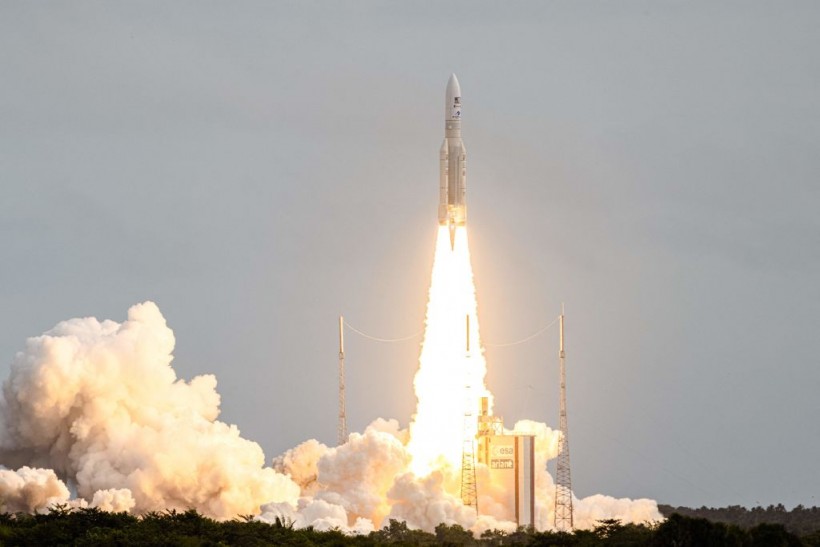Europe's aspirations in space exploration suffered a setback as the final launch of the Ariane 5 rocket was delayed due to a technical issue, announced French company Arianespace on Thursday and reported first by AFP.
This unforeseen development adds to a series of challenges faced by European space endeavors.
"It has come to light that there is a risk to the redundancy of a critical function on the Ariane 5. Consistent with safety requirements, Arianespace has decided to postpone the roll-out of the #VA261 launch vehicle. Analyses are underway to determine a new launch date," Arianespace wrote in a tweet.

TOPSHOT - This photograph taken on April 14, 2023, shows Arianespace's Ariane 5 rocket lifting off from its launchpad, at the Guiana Space Center in Kourou, French Guiana.
Ariane 5's 117th and Last Mission
With a remarkable history of 27 successful missions, the Ariane 5's 117th and last mission was slated for takeoff from Europe's spaceport in Kourou, French Guiana, between 2126-1001 GMT on Friday.
However, a critical concern regarding the redundancy of an essential function on the Ariane 5 was brought to light, prompting Arianespace to make the decision to postpone the rollout of the launch vehicle in adherence to safety protocols.
Arianespace said that analyses are presently underway to determine a suitable alternative launch date for the Ariane 5.
Meanwhile, the rocket, along with its payload consisting of a French and a German communication satellite, remains securely housed in the final assembly building, ensuring stable conditions for their preparation.
This delay arrives at a time when Europe grapples with the challenge of independently launching heavy-load missions into space.
The repeated setbacks faced by the next-generation Ariane 6 project, coupled with Russia's withdrawal of its Soyuz rockets due to Ukraine-related sanctions, have posed significant obstacles in achieving this objective.
It has come to light that there is a risk to the redundancy of a critical function on the Ariane 5. Consistent with safety requirements, Arianespace has decided to postpone the roll-out of the #VA261 launch vehicle.
— Arianespace (@Arianespace) June 15, 2023
Analyses are underway to determine a new launch date.
Europe's Space Setbacks
Moreover, European space initiatives suffered a significant setback in December 2022 when the inaugural commercial flight of the Vega C light launcher, the next-generation rocket, experienced a failure.
With limited alternatives at their disposal, the European Space Agency (ESA) found themselves compelled to seek assistance from their competitor, SpaceX, to conduct the launch of the Euclid space telescope mission in the subsequent month.
While confronting these obstacles, Europe's space program faces an uncertain future regarding the Ariane 6 project. Initially slated for a 2020 launch, the project's aspiration of achieving a successful liftoff by the end of this year now hangs in the balance.
The difficulties encountered thus far have raised doubts about the project's timeline and the overall feasibility, casting a shadow of uncertainty over its progress.
The delay in the ultimate launch of the Ariane 5 rocket serves as a poignant reminder of the complexities and uncertainties accompanying space exploration.
European space agencies and stakeholders will undoubtedly persist in their endeavors to tackle the technical challenges and setbacks, aiming to revitalize their initiatives and reclaim momentum in the fiercely competitive field of space exploration.
Related Article: ESA's Venus Probe Will Undergo 'Intense Aerobraking' Before Diving Into Venus' Hellish Atmosphere






